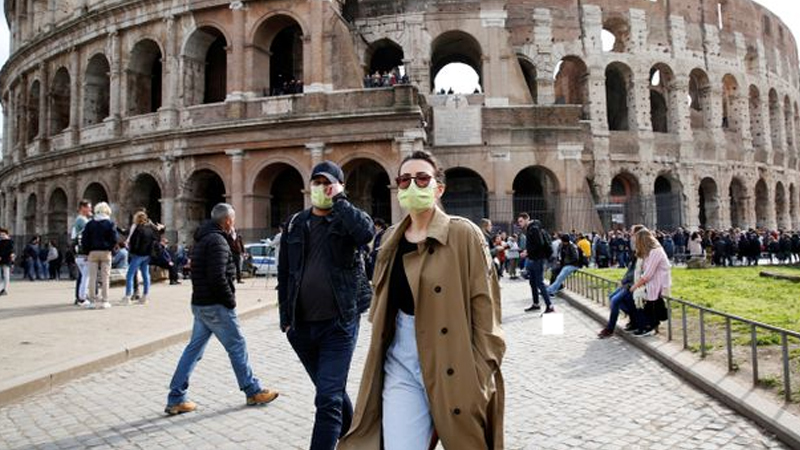The European Union’s self-purported goals are to “promote peace, its values and the well-being of its citizens.” It claims to “offer freedom, security and justice without internal borders.” It declares a commitment to “enhanc[ing] economic, social and territorial cohesion and solidarity among EU countries.”
Yet the EU has left Italy — which has been a member since the EU’s inception in 1958 — in the lurch from the beginning of the coronavirus pandemic. Ignoring Italy’s pleas for help, it has done nothing but exacerbate the escalation of Italy’s economic and public health crisis. Its lack of response has shown each one of these stated principles to be exactly what they are: not merely empty promises, but bold-faced lies. Far from a democratic organization of peace and cooperation, the EU is a federation controlled by Europe’s major powers whose only concern is protecting capitalist profits as the world’s markets falter.
The Outbreak in Italy
Italy was the first country in Europe to go on complete lockdown as a result of the severity of the coronavirus outbreak. On March 9, the government closed its borders and shut down all businesses except for groceries and pharmacies. Schools, universities, and public events have also been closed or cancelled. Police are patrolling the streets, issuing fines to people who leave their homes without written permission. Healthcare workers are setting up makeshift intensive care units in the corridors of hospitals and are working themselves to the brink of exhaustion to treat as many people as they can.
But these emergency measures have not been enough to stop coronavirus from ripping through the country, infecting thousands at increasing rates and killing more and more people each day. There are nearly 35,713 cases of coronavirus in the country already, which have resulted in an astounding 3,000 deaths so far. The government announced on Wednesday that 475 of those deaths occured in a period of just 24 hours.
Like many of the countries hit hardest by the crisis, after decades of austerity measures and cuts to social programs, Italy’s government and universal healthcare system were unprepared to stem the spread of the virus or care for the infected. Without enough staff, beds, or medical equipment to treat patients, doctors are being forced to prioritize care, not for those with the worst symptoms, but those with the highest chances of recovery.
Meanwhile, Italy’s economy, which was already weak when the crisis hit, was paralyzed as global markets crashed, production halted, and the country was forced to divert extra resources towards fighting the epidemic.
The government, without a contingency plan to combat such a public health crisis, flailed in its initial approach to the outbreak, increasing the rate at which COVID-19 spread. It is bailing out Italy’s businesses while its hospitals are overrun and most people are struggling to survive the crisis. Most workers are on lockdown at home, forced to do the dual work of working from home and caring for their family members. Retirees cannot survive the lockdown with the meager pensions they receive.
And many more workers are still forced to be on the job, risking exposure. This has sparked a sector of workers in Italy and abroad to begin fighting back against unsafe working conditions and the failure of the ruling class to combat the pandemic. They are organizing in their workplaces, staging strikes, walkouts, and sickouts to demand guaranteed paid time off if they get sick, protective equipment, and formalized measures to keep themselves and their loved ones safe during the pandemic.
As the ruling class stumbles and as the outbreak intensifies, many more of these actions will be necessary to fight this crisis that capitalism has created. But Italy’s economy and its gutted healthcare system are not the only reasons the crisis has reached this point. And they’re not the only reasons it’s going to get worse. The EU, hand in hand with the European Central Bank (ECB), refuses to give necessary aid to Italy to help combat the coronavirus.
The EU Cares About Profits, Not People
Last month, when the coronavirus epidemic began to reach a critical point in Italy, with cases of infection rising rapidly and the Italian economy at a near standstill, Italy called on the EU to send medical aid and supplies. The EU and every member country ignored the call completely. In fact, several countries, including Germany, even stopped exports of vital medical supplies, such as masks, from going to Italy. The rest of Europe cut off all transportation to and from Italy — a vain attempt to prevent the outbreak from spreading. Rather than work with Italy to contain the virus and get care to those affected, the EU reinforced the borders it is so fond of saying do not exist between member countries.
Though the EU is first and foremost an economic institution, one that is responsible for regulating the Euro, it also alleges to be a political alliance of 27 countries that will work together in times of crisis. The EU Civil Protection Mechanism is a division of the EU specifically designed to help countries overwhelmed by disasters — and supposedly allows them to receive both aid from member countries and the EU’s help in planning a response to the crisis. It has funds of nearly €500 billion for these purposes. But when Italy asked for this aid, it received little more than silence from its supposed allies.
The EU has instead focused on Italy’s economy and its potential effects on the EU’s market prospects. Italy’s economy was already weak when the crisis hit. It has high levels of government debt (one of the highest in the world) and high unemployment, making it one of the most precarious economies in the EU. Decades of austerity measures by the Italian government (under pressure from the EU) left it unequipped with the necessary resources to combat the crisis and put responsibility for the response on the backs of the millions of working class people who are forced to stay at home without sufficient time off, who have been laid off, or who are still being forced to work and risk exposure to the virus.
Furthermore, the European Central Bank (ECB), which is the economic arm of the EU, has left Italy out to dry despite the havoc that the pandemic has wreaked on its economy. Christine Lagarde, the bank’s president, said on March 13 that the ECB is not responsible for debt relief for countries stricken with a severe coronavirus outbreak. The message was clear: Italy is on its own. After these comments sparked international criticism, Lagarde walked back her words as a “misunderstanding,” but this did not stop the Italian markets from dipping drastically after the press conference.
Shortly after, when pressed about its response to Italy’s crisis, the European Commission (the executive branch of the EU) announced that it would take an “understanding” approach to Italy’s increased government spending and would not discipline it for violating the EU’s standards for budgetary restrictions and economic growth in light of the extraordinary circumstances facing the country. It advised Italy to implement fiscal measures and certain cuts to reallocate funds to the overwhelmed healthcare system.
Meanwhile, the EU has agreed to make a further €25billion ($28 billion) in funds available to combat the crisis, but so far it is still quibbling over how to allocate them. It is likely that they will use the emergency fund to create lines of credit for virus-stricken countries and allow the ECB to buy up government debt — in other words, the EU is speculating off of the pandemic, trying to make conditions better for world banks at the expense of the lives and livelihoods of millions of people.
In this sense, this “response” is neoliberalism taken to its most extreme conclusions. The EU would have Italy institute further austerity measures and budgetary restrictions to get itself out of a crisis that requires urgent and radical structural changes to slow and address the outbreak. Despite its rhetoric of working together to combat the social and economic crisis, the EU’s solution is to put Italy further in debt so that the banks can stave off an unchecked downturn now and ensure profit later. Instead of coordinating a united European response to tackle the pandemic, it is treating the crisis as solely an economic one.
At the same time, while the EU puts all its efforts into protecting the markets, individual member countries are tending towards more “nationalist” decisions in their responses to the outbreak. As a result of the depth of the crisis, European states are moving from the rules of the neoliberal game to a kind of “state capitalism” and in doing so they are willing to sacrifice Italy to save themselves. Each country is instituting its own emergency measures to bolster its economy and strained healthcare infrastructure and to slow the further spread of the virus. France has ordered people to stay in their homes. Spain has taken over private healthcare providers and is requisitioning medical supplies.
These dual phenomena show that when it comes down to it, the EU is not an organization of international cooperation but simply an apparatus by which to easily move capital and leverage government debt. And in this tension, we can see clearly that capitalism is not equipped to handle the present crisis.
It should be clear that even with its structural and bureaucratic limitations, the EU has the resources to ease the effects of the coronavirus outbreak in Italy. It could intervene to save lives. After all, it is an alliance of Europe’s biggest powers. The EU currently controls nearly 20% of the world’s GDP — it has the funds to directly support Italy during this time. Its member countries have massive medical equipment industries. The EU could coordinate an effort to provide necessary medical aid to Italy and contain the spread and impact of the virus, as it coordinated smaller-scale efforts before to stop wildfires in Sweden in 2018.
But the EU exists to promote free trade among European countries for the benefit of Europe’s most powerful countries and at the expense of the vast majority of people living within its borders. Its prime directive is to protect the capitalist economy and capitalist profits. As a result, it is underestimating the extent of the public health crisis. But in doing so, it is failing to carry out even its primary mandate. The EU is trying to take the same measures it did to combat the 2008 crisis, measures that resulted in Greece’s bankruptcy and its chronic indebtedness; if these measures were catastrophic for Greece then, they will certainly be worse for countries like Italy in the current crisis.
As the death count in Italy rises — with hospitals unable to care for sick patients and family members forced to say their last goodbyes to their infected loved ones via Skype and FaceTime — the EU has made it clear that it does not care about the “well-being” of the millions of people within its limits. There is no “solidarity” with the tens of thousands of people battling the disease, the millions on lockdown, or the workers who are being forced on the job in the midst of a public health crisis. The EU’s flexible borders — which have now closed as the virus spreads — have been revealed to be “open” only to trade and the imposition of foreign debt.
The failure of the EU to respond to Italy’s crisis exposes in sharp relief the limitations of capitalist international coordination — which can never protect the interests of working people and the oppressed who are hardest hit by capitalism’s crises. But it also shows the urgency and necessity of a real internationalist effort in the interests of the working class, the type that only socialism can provide.











